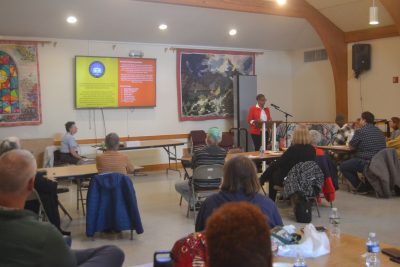The Hard Facts of Racial Disparities in the Healthcare System
News Based on facts, either observed and verified directly by the reporter, or reported and verified from knowledgeable sources.

Talking about racial injustice and the deleterious impacts it has on countless lives has always been a challenge for society.
Opening that door for a rich and informative exchange on Sunday was Race Amity of Northern Westchester & Putnam, which invited the public for the open discussion “Community Forum on Racism: How We All Pay the Price.” The forum took place at the First Presbyterian Church of Yorktown and included health officials, members of the Peekskill NAACP, Race Unity Circle and Yorktown for Justice.
Speaking on the growing disparities of Black maternal health and sickle cell disease was Cheryl Hunter-Grant, chair of the state Maternal Mortality & Morbidity Advisory Council and former executive director of the Lower Hudson Valley Perinatal Network.
“Part of my life’s goal is to ignite in you a way to see how you can take action,” Hunter-Grant told the audience of around 40 people. “We can recognize that people are people but more important is to dismantle the system that negates a person’s recognition of another person’s humanity. The system is perpetuating the inequities – and racism is systemic – manifested through people who have a personal bias. We must dismantle the system that is built on the premise that there are differences.”
Hunter-Grant cited statistics and the rising numbers of maternal mortality rates among Black women. She spoke to the discriminatory gaps in the medical system that result in the lack of prenatal care that could prevent 78 percent of the maternal deaths caused by hemorrhage and mental health conditions or other medical matters.
Sickle cell disease (SCD), an inherited blood disorder, affects about 100,000 Americans and occurs in about one of every 365 Black births. Hunter-Grant pointed out that SCD rates are rising.
SCD is when red blood cells become hard and sticky and look like a C-shaped farm tool called a sickle, preventing oxygen from reaching organs and tissues in the body.
Hunter-Grant said newborn screening for SCD took years before it was available in most states, but today it is mandated in all 50 states.
At Sunday’s forum, small groups formed to discuss their thoughts on racism in healthcare and shared them with the audience. Some spoke about how many people are unaware of their own personal biases, which perpetuates systemic racism. Others said that while many may care about equity, typically they don’t get involved.
The issue of self-advocacy was raised, which should be stressed to Black patients, particularly when they have a medical issue. Many voiced their own feelings about not helping as much as they could and how these types of forums can motivate them to become more involved.
“People make pre-judgements and assumptions that cause division among us,” said one man from Ossining. “It’s hard to generate change, but here we have exchanged ideas that I will share with my friends and my community.”
Race Amity of Northern Westchester & Putnam was established in 2018 by co-founders Susan Cody and Irene Chege, both Somers residents. The group meets the second Sunday of every month at the Somers Library and features special guests or video screenings. Ideas and themes for discussion are planned before each meeting.
There are Race Amity groups that meet monthly throughout the United States. The goal is to talk about racial differences in an engaging atmosphere.
For more information about Race Amity of Northern Westchester & Putnam, visit its Facebook page at https://www.facebook.com/RaceAmityofNorthernWestchesterandPutnam/

Abby is a local journalist who has reported on breaking news for more than 20 years. She currently covers community issues in The Examiner as a full-time reporter and has written for the paper since its inception in 2007. Read more from Abby’s editor-author bio here. Read Abbys’s archived work here: https://www.theexaminernews.com/author/ab-lub2019/


